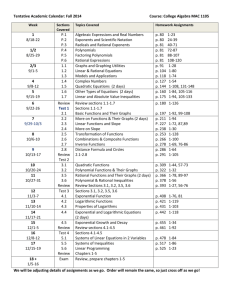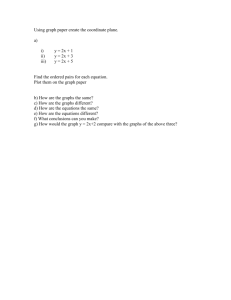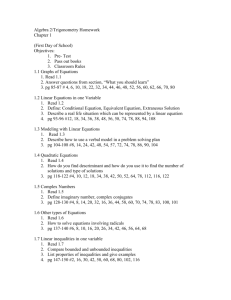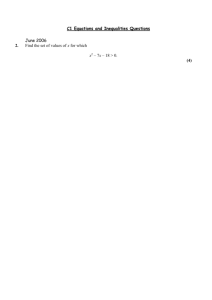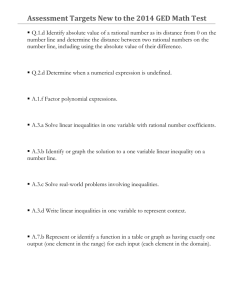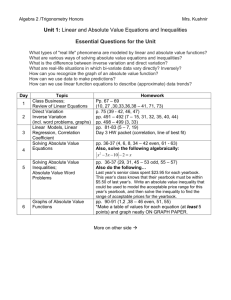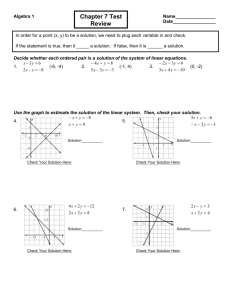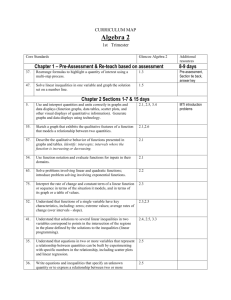Math 15 – Elementary Statistics (SRJC)
advertisement
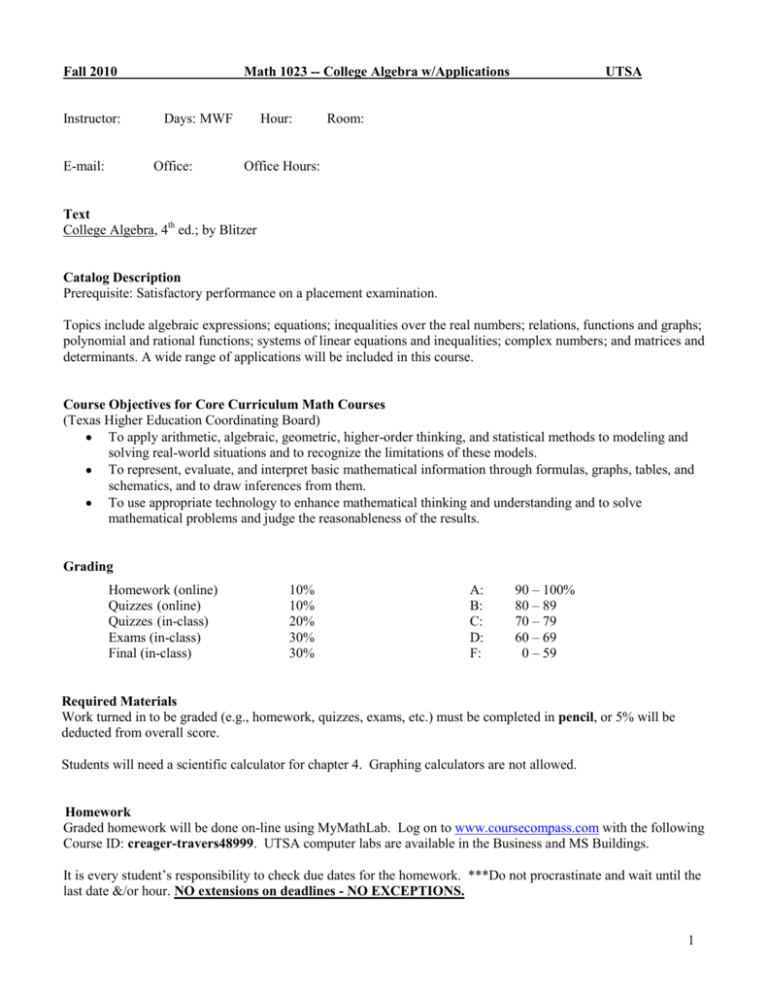
Fall 2010 Instructor: E-mail: Math 1023 -- College Algebra w/Applications Days: MWF Office: Hour: UTSA Room: Office Hours: Text College Algebra, 4th ed.; by Blitzer Catalog Description Prerequisite: Satisfactory performance on a placement examination. Topics include algebraic expressions; equations; inequalities over the real numbers; relations, functions and graphs; polynomial and rational functions; systems of linear equations and inequalities; complex numbers; and matrices and determinants. A wide range of applications will be included in this course. Course Objectives for Core Curriculum Math Courses (Texas Higher Education Coordinating Board) To apply arithmetic, algebraic, geometric, higher-order thinking, and statistical methods to modeling and solving real-world situations and to recognize the limitations of these models. To represent, evaluate, and interpret basic mathematical information through formulas, graphs, tables, and schematics, and to draw inferences from them. To use appropriate technology to enhance mathematical thinking and understanding and to solve mathematical problems and judge the reasonableness of the results. Grading Homework (online) Quizzes (online) Quizzes (in-class) Exams (in-class) Final (in-class) 10% 10% 20% 30% 30% A: B: C: D: F: 90 – 100% 80 – 89 70 – 79 60 – 69 0 – 59 Required Materials Work turned in to be graded (e.g., homework, quizzes, exams, etc.) must be completed in pencil, or 5% will be deducted from overall score. Students will need a scientific calculator for chapter 4. Graphing calculators are not allowed. Homework Graded homework will be done on-line using MyMathLab. Log on to www.coursecompass.com with the following Course ID: creager-travers48999. UTSA computer labs are available in the Business and MS Buildings. It is every student’s responsibility to check due dates for the homework. ***Do not procrastinate and wait until the last date &/or hour. NO extensions on deadlines - NO EXCEPTIONS. 1 Quizzes You will have a quiz almost every Wednesday (check calendar for dates). In-class quizzes are closed books, closed notes and, for the most part, no calculators. Exams There are 3 exams (check calendar for dates). Exam questions will be mechanical and conceptual in nature. Exams are closed books, closed notes and, for the most part, no calculators. IF a test is missed beyond a student’s control, you must submit documentation and the final grade may be used to replace the missing test grade. Final The final is on .., and will be cumulative. The final is closed book and closed notes. You may use your calculator. Failure to take the final will result in an F for the course. There will be no early or make-up quizzes, exams, or final - NO EXCEPTIONS. Media All cell phones, I pods, computers, etc., must be turned off and stored away prior to the start of class. A student who is found to be using media in class will be asked to leave. Course Expectations Students are expected to read the book and learn the terminology and any new notation that is used. Students are expected to read the discussion topic before each lecture. Students are expected to work on the homework every day for at least 2 hours and come to the next class prepared to ask and answer questions. Work turned in must be neat and readable. The proper format for your work will be illustrated in class during lectures. If I can’t read a given answer or follow the reasoning, that particular question will receive no credit. Attendance Mathematics is a demanding subject, so attendance is very important and success requires a commitment to come to class every day. If missing class is unavoidable, it is the student’s responsibility to contact me or a classmate to get any information you missed. Math Tutoring Q Lab in the MS Building 2.02.54 Math Lab in the Science Building 2.01.02 Course Content 2 Note: Other topics may be included if time permits. Chapter/Section Topic P Prerequisites: Fundamental Concepts of Algebra P.1 P.2 P.3 Radicals and Rational Exponents P.4 Polynomials P.5 Factoring Polynomials P.6 Rational Expressions 1 Equations and Inequalities 1.1 Graphs and Graphing Utilities 1.2 Linear Equations and Rational Equations 1.3 Models and Applications 1.4 Complex Numbers 1.5 Quadratic Equations 1.6 Other Types of Equations 1.7 Linear Inequalities and Absolute Value Inequalities 2 Functions and Graphs 2.1 Basics of Functions and Their Graphs 2.2 More on Functions and Their Graphs 2.3 Linear Functions and Slope 2.4 More on Slope 2.5 Transformations of Functions 2.6 Combinations of Functions; Composite Functions 2.7 Inverse Functions 3 Polynomial and Rational Functions 3.1 Quadratic Functions 3.5 Rational Functions and Their Graphs 4 Exponential and Logarithmic Functions 4.1* Exponential Functions 4.2* Logarithmic Functions 4.3* Properties of Logarithms 4.4 Exponential and Logarithmic Equations 4.5 Exponential Growth and Decay; Modeling Data 5 Systems of Equations and Inequalities 5.1 Systems of Linear Equations in Two Variables 5.2 Systems of Linear Equations in Three Variables 5.5 Systems of Inequalities 6 Matrices and Determinants 6.1 Matrix Solutions to Linear Systems 6.3 Matrix Operations and Their Applications 6.5* Determinants and Cramer’s Rule MAT 1023 College Algebra with Applications 3 Syllabus Addendum Course Objectives: To provide students the opportunity to develop algebra skills which are useful in everyday life as well as necessary to pursue further study in their majors. Emphasis will be on applications in business, the social sciences, the arts, and education. Course Description: This course will cover algebraic expressions, equations, inequalities over the real numbers, relations, functions and graphs, polynomial and rational functions, exponential and logarithmic functions, systems of linear equations and inequalities, complex numbers, matrices and determinants. Emphasis will be on applications. Core and Domain Objectives: This course may be taken to fulfill the Core Curriculum requirement in Mathematics under Domain I, Mathematics and Science. Please see the Undergraduate Catalog for Core and Domain Objectives. University Policy on Dishonesty: Policy on Cheating: Students are expected to be above reproach in scholastic activities. Students who violate University rules on scholastic dishonesty are subject to disciplinary penalties, including the possibility of failure in the course and dismissal from the University. “Scholastic dishonesty includes, but is not limited to, cheating, plagiarism, collusion, the submission for credit of any work or materials that are attributable in whole or in part to another person, taking an examination for another person, any act designed to give unfair advantage to a student or the attempt to commit such acts.” Regents’ Rules and Regulations, Part One, Chapter VI, Section 3, Subsection 3.2, Subdivision 3.22. Since scholastic dishonesty harms the individual, all students, and the integrity of the University, policies on scholastic dishonesty will be strictly enforced. 4

